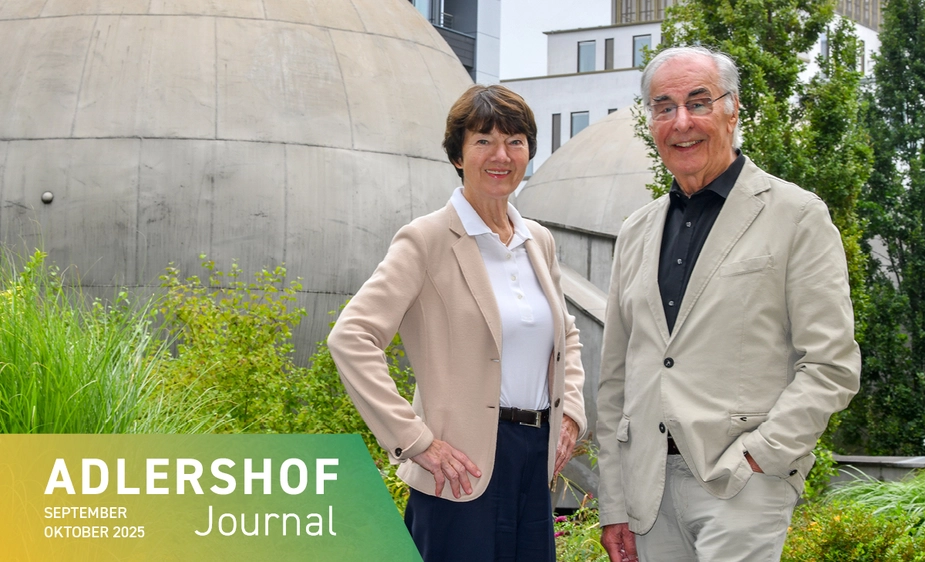Broken but not Defeated – The Adlershof Pioneers
After 1990, GDR scientists such as Christine Wedler and Norbert Langhoff turned Adlershof into an economic success story
After the fall of the Berlin Wall, many scientists in the former East Germany suddenly found themselves without any prospects. This was the case for Christine Wedler and Norbert Langhoff when they had to start over – and they would go on to contribute to Adlershof’s economic success story post-1990.
With her doctorate in chemistry, Christine Wedler founded ASCA GmbH Angewandte Synthesechemie Adlershof in the year 2000 together with Professor Hans Schick (1937–2016). Today, the company develops reference materials for analysing contaminants in food and the environment and supplies pharmaceutical companies, universities, and research institutions. ASCA will celebrate its 25th anniversary at the end of October 2025.
Wedler had been working at the Central Institute for Organic Chemistry (ZIOC) since 1973, but this was dissolved after reunification as it belonged to the GDR’s Academy of Sciences. Wedler and Schick, however, were fortunate and had the chance to continue their research at the newly founded Institute for Applied Chemistry (ACA) – until the Berlin Senate stopped funding it. In 1997, they both found themselves unemployed.
Norbert Langhoff, a qualified engineer, headed the Centre for Scientific Instrument Engineering in Berlin-Adlershof (ZWG). With around 1,700 employees, the ZWG was unique to the GDR. As much high-quality technology as possible had to be developed and manufactured domestically due to ongoing foreign currency shortages and Western embargo regulations. Equipment from the ZWG was in demand not only in the GDR, but in all member states of the Council for Mutual Economic Assistance (COMECON).
In 1989, Langhoff was one of the few directors at the Academy of Sciences who had the trust of his employees. He formed a working group in 1990 to consider what the future of the ZWG might look like in a market economy. The idea was to establish companies and combine them into a holding company – after all, “we had learned how knowledge can be turned into work.” However, his plan never became a reality since the ZWG was dissolved at the end of 1991 along with the Academy of Sciences.
When the decision was made on 12 March 1991 to create an ‘integrated landscape of business and science’ in Adlershof, more than 15 technology companies had already been founded there. Companies such as Lasertechnik Berlin GmbH, Bestec GmbH and Sentech Instruments GmbH quickly achieved international success – with nitrogen lasers, ultra-high vacuum systems, and measuring systems for plasma-based technologies, among other things.
Langhoff himself founded a technology transfer company in 1990 and then the IfG (Institut für Gerätebau GmbH) in 1993. It manufactures devices for process-oriented analysis and special X-ray optical systems, such as X-ray capillary optics. In 2015, Langhoff sold the IfG to Helmut Fischer GmbH from Sindelfingen, which continues to develop and manufacture high-quality products in Adlershof to this day.
Wedler and Schick started afresh after becoming unemployed with a pilot project that initially succeeded in securing jobs for 46 of their laid-off colleagues. This paved the way for the founding of their own company, ASCA GmbH, in 2000, which quickly gained a foothold in the market thanks to useful industry contacts. The first generation of founders in Adlershof came from a research background and soon acquired knowledge about the market economy.
“We quickly learned the rules by which the Federal Republic functions,” says Langhoff, who celebrates his 90th birthday at the end of October.
Despite criticising the lack of appreciation for the East Germans’ life achievements in retrospect, Wedler emphasises that she has no ifs or buts about arriving in reunified Germany. Langhoff, too, would have liked to see East Germans have more of a say: “With our knowledge, many things could have been achieved more quickly”. Regardless of this, both are able to reflect on their life’s work with pride and have received the recognition they deserve. Wedler was named “Berlin Entrepreneur of the Year 2006”, while Langhoff received the German Order of Merit 1st Class in 2011.
Today, Adlershof’s pioneering companies are facing a generational change, or, in many cases, have already undergone it. Many of the new managing directors were just children or teenagers at the time of German reunification; some were born after 1989. For them, East and West are nothing more than compass directions. With an eye to the future of her company, Christine Wedler has now appointed two new managing directors (born in 1989 and 1991).
Dr. Peter Strunk for Adlershof Journal
